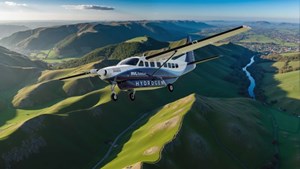News
ZeroAvia and RVL Aviation to fly zero-emission cargo services in the UK
ZeroAvia has signed an agreement with RVL Aviation which will see RVL operate Cessna Grand Caravan aircraft retrofitted with ZeroAvia’s H2-electric, zero-emission ZA600 powertrain. Flights within the British Isles will commence once certification for the engine, airframe integration and planned services are obtained and all retrofit, and training work is complete.
Analysis performed by RVL and ZeroAvia confirms that the ZA600-enabled Cessna Caravan would meet existing operational requirements while virtually eliminating the climate impact of the operations. There are nearly 1,000 aircraft operating cargo routes around the world today that could in future be powered by ZA600 powertrains.
This current agreement focuses on one type of aircraft, Cessna Caravan 208B, with RVL working with zero-emission specialist MONTE on the aircraft lease. The partners will explore opportunities to launch further small turboprop operations in the growing RVL network based on the success of the initial operations, as well as expand the technology across its other operations when the technology and operating conditions permit.
RVL Aviation is a specialist aviation services provider with more than 40 years of experience. The company and its skilled people deliver their expertise to a wide range of Government and private sector organizations, helping to support economic and environmental prosperity agendas. RVL Aviation is headquartered at East Midlands Airport, operating primarily from its hangar and maintenance facility, and its capabilities include airborne survey, aerial surveillance, aerial dispersant services and aircraft charter.
ZeroAvia’s H2-electric engines use H2 in fuel cells to generate electricity to power electric motors that turn propulsors, with the only byproduct being water. Analysis suggests that switching to fuel cell propulsion can provide an overall climate impact reduction in the region of 90%. Further, H2-electric propulsion can reduce overall operating costs for carriers due to the lower requirement for maintenance and lower fuel costs in the scaled operations.
Val Miftakhov, Founder & CEO, ZeroAvia, said, “Today is a proud day for all of our team in our pursuit of a clean future of flight as we now have a confirmed launch operator with concrete plans to fly aircraft powered by the ZA600 engine. We have the engine design; we have the integration plans for the launch airframe; we have the solutions to provide the H2 fuel; and we have the customers wanting to operate the first routes. We now need to double our attention on the certification testing that will get this route flying and then ramp up production for our other confirmed ZA600 customers.”
Dave Connor, CEO of RVL Aviation, said, “This is a genuinely exciting initiative, and it is a crucial step forward for our ambition to be at the heart of the global effort to decarbonize this sector. The team at ZeroAvia has done a remarkable job to lead and progress this technology, and everyone at RVL Aviation is proud to be on this path alongside other forward-thinking businesses.
“Sustainability is not a single action. Rather it is a series of steps: some small, some large, that add up to the inexorable progress that society demands and we all seek. This zero-emission initiative is a large step, and we look forward to operating the first scheduled commercial flights by this aircraft.”
ZeroAvia has already extensively tested a prototype of its first ZA600-engine aboard a Dornier 228 aircraft at its UK base, with the powertrain currently subject to a certification application with the UK CAA. The company has also performed advanced ground tests in the U.S. and UK for the key building block technologies for the ZA2000 system, including cryogenic tanks for liquid H2 fuel storage and proprietary high-temperature PEM fuel cell and electric propulsion systems. ZA2000 will support up to 80-seat regional turboprop aircraft such as the ATR72 or the Dash 8 400.


